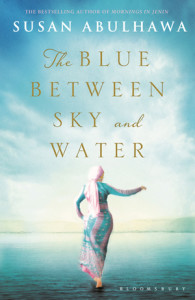 THE BLUE BETWEEN SKY AND WATER
THE BLUE BETWEEN SKY AND WATER
Susan Abulhawa
Bloomsbury, June 2015, RRP $29.99
The Blue Between Sky and Water is one of those rare novels that takes devastating themes and events, but fills them all with a sense of hope. Set in Palestine during and after the Naqba, up until the mid-2010s, the novel could very easily have been many things. While its bias is obvious*, Abulhawa avoids diatribe and sentimentality in building her story of a family and a country torn apart.
In 1948, Nazmiyeh and her family are forced to leave their village, Beit Daras, for Gaza. In the ensuing years as they rebuild their lives as refugees in the city, what is left of the family becomes further divided as its members migrate, perish, or are imprisoned. Nazmiyeh, eventual mother of ten sons, suffers deep heartbreak in the loss of her sister and her hometown. Yet she remains a vibrant and bawdy woman, dancing, and enjoying her life. Nazmiyeh is a figure of hope and resilience throughout the story, even as she exhibits physical paralysis from the weight and shock of her losses.
Divided from her extended family as a child, Nur is a lonely and lost woman. Reading the progression of her childhood might have shocked or horrified me several years, even several months ago, before I started working within the legal area and seeing just how common (though no less tragic) such stories are. So be warned, potential readers, that this story might be deeply affecting, potentially triggering, for survivors of neglect, sex abuse and eating disorders**. Nur has lost all her links to Palestine and the large family she has there. It is only in finding her way back to them that she can start to heal from her damaging childhood.
A mystical theme also runs through the novel. The characters are assisted at various times by a djinn, Sulayman, and by spirits and dream figures. Characters are reborn and communicate across generations, in visions and dreams. This does not feel contrived or even that fantastical. Abulhawa has created a world in which the reader undestand that the family, at least, believes that these events are happening. The forensic truth of it doesn’t particularly matter.
This is one of those rare novels that is genuinely sad without being depressing. Yes, its events are terrible. The peppering in of excerpts from various commentators on the Israel-Palestine conflict ground the book in its wearying reality. Abulhawa’s delicate hand allows the reader to experience these things without dictating their reactions or tugging too hard on the same heartstrings. Its manipulation is subtle, its language matter-of-fact. Despite the history of this family and of Gaza being fairly summed up with the phrase, “And then it got worse,” joy manages to prevail.
In the end, I can close a book like this and go back to my own life with its troubles and joys. This novel is a dip into a world of hardship that I can walk away from, knowing that there are people who must experience it daily. Indeed, poverty tourism is joked about within the text itself. I also read this as an ironic self-awareness of form. Like poverty tourism, a novel can only provide a glimpse of an experience that will eventually be put away. Though reading, for the most part, does not tend to give rise to feelings of high-minded, self-sacrificing nobility as poverty tourism does. Abulhawa has produced an elegantly balanced and moving novel.
The Blue Between Sky and Water has touched me in a way very few books do. I think I can feel Khaled’s small fingers lacing through mine. He wants you to come and hear his story, too.
*Well, all books have biases. And so do I.
**And also probably Antisemitism. I don’t think the author herself is, but the characters express active hatred for Zionists and Israelis.

